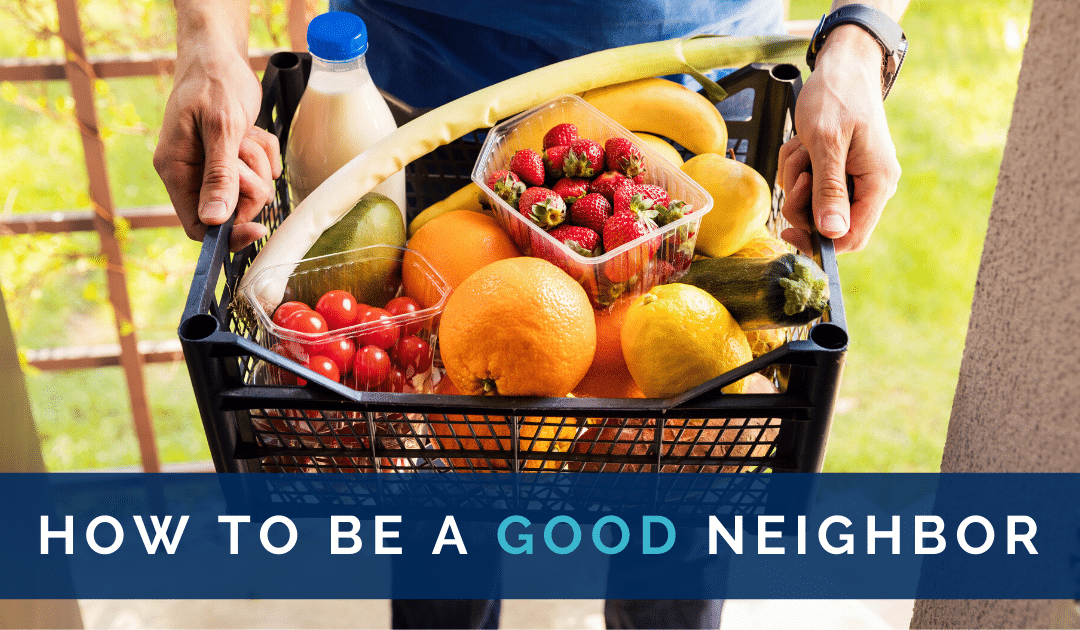Our world has changed seemingly overnight. As we deal with the immediate crisis—and learn behaviors that ensure the safety and well-being of ourselves and others—we all have an opportunity to make our world a kinder and more generous one.
Here are 8 ways to be a good neighbor during trying times.
Stay safe, stay home
Across the country, various forms of shelter-in-place and social distancing orders have gone into effect. Stay up to date on your city’s instructions and follow the orders and advice of local officials. By slowing and limiting the spread of infection, we can “flatten the curve”—protecting vulnerable community members and preventing local hospitals and emergency services from overwhelm.
Check-in
For the elderly, immunocompromised or otherwise vulnerable, these are especially scary times. Reach out to those neighbors and friends (on the phone, email, through a closed door) and see if there’s anything you can do for them. A grocery run, food pickup or dog walk could make a huge difference. Let them know you’re there for them. If you yourself are in the vulnerable cohort, make it easy for others to know how they can help—there are plenty who want to help but don’t know how.
Donate blood
In the midst of coronavirus anxiety, blood drives have been canceled and donations have dropped. However, maintaining our nation’s blood supply is still critical: Every 2 seconds, a patient needs a blood transfusion. If you’re healthy, consider giving blood. Donation centers are skilled in infection control practices and adhere to strict safety procedures.
Do a virtual food drive
You can deliver needed groceries to families and community members right from your computer. Check the websites of your local food banks, city or city health departments or non-profits that focus on food insecurity. You can sign up as an individual or as a group. For the latter, get creative and launch a drive with friends, family, colleagues or neighbors.
Volunteer
Check with local non-profits, charities or your city for volunteer needs. Many neighborhoods are also forming their own emergency response teams. Volunteers can sign up for a range of activities or projects. If you have the gift of health and security, volunteering is one of the most rewarding ways to pay it forward.
Shop local
Local businesses are hurting, and some may not recover. Patronage right now is more crucial than ever. Place orders online; buy gift cards; keep up your membership. Many restaurants are staying afloat by offering take-out and delivery—if you can afford it, mix up your in-home creations with local cuisine. And if you can be generous in tipping your delivery drivers, you’ll be helping them through a rough time.
Donate
Public health crises spotlight the gaps in our communities and this crisis is no different. Many hospitals are in need of gloves, goggles, N95 masks, disinfectant wipes, hand sanitizer, gowns, and other PPE. Look through your closets and garage and see if you’ve got extras (new and unused) you can donate to local hospitals. Also check in with your favorite charities, causes or non-profits and see how you can help.
Spread kindness
These are stressful times, and a little kindness goes a long way. For those workers on the front lines (who themselves are at increased risk), receiving some patience, kindness, and compassion from customers will buoy their spirits. Be generous where you can. Remember too, that just as with the oxygen mask in the airplane, you can only take care of others after taking care of yourself. So, find ways to make self-care and mental health a priority.
This article is furnished by California Casualty, providing auto and home insurance to educators, law enforcement officers, firefighters, and nurses. Get a quote at 1.866.704.8614 or www.calcas.com.
- Graduation – When to Remove Your Child from Your Auto Policy - May 18, 2023
- How to Prevent Catalytic Converter Theft - May 17, 2023
- How Much Does Home Insurance Cost? - May 17, 2023

